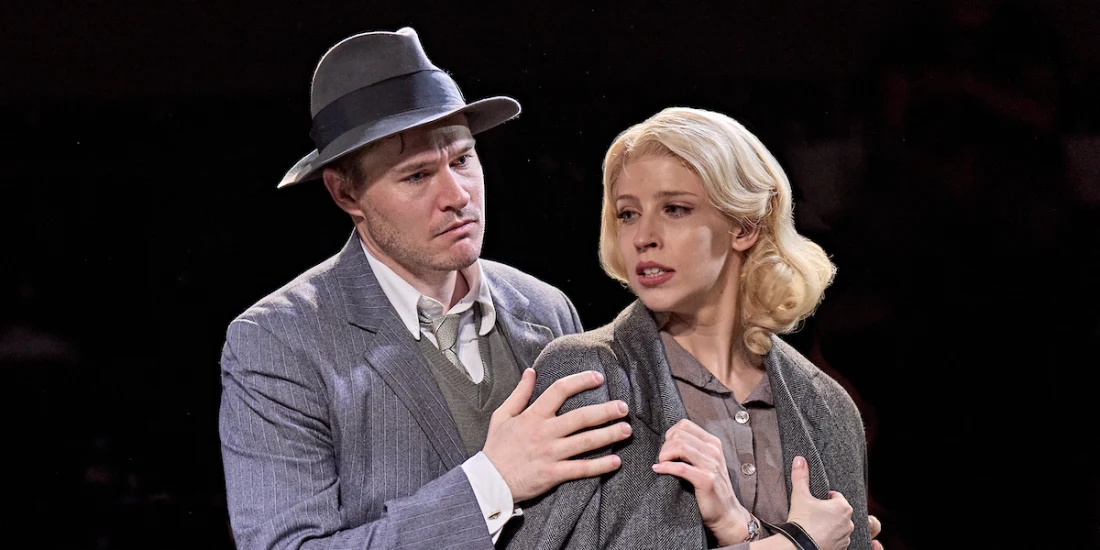
'The Third Man' review – this musical adaptation of the classic film feels sadly redundant
Read our two-star review of The Third Man, directed by Trevor Nunn, now in performances at the Menier Chocolate Factory to 9 September.
That all-too-frequent theatrical question – namely, why? – hovers over every minute of The Third Man, the long-aborning stage musical adaptation of the Graham Greene novella and classic Carol Reed film that was first announced a decade ago.
The challenges are enormous. Not only is the film to this day celebrated for its visual chiaroscuro, a surpassingly evocative primary colour palette that onstage risks looking drearily monochrome. Throw in its own musical signature – how many film scores make use of a zither? – and you’ve got a sizable set of hurdles that Trevor Nunn’s well-intentioned production doesn’t begin to overcome.
The show may appeal to those musical theatre devotees who feel left out of the forward sweep of a genre that will finds this show’s total antithesis, the Tony-winning A Strange Loop, opening next week. But this one doesn’t feel so much set in 1947 Vienna as written during that same time, though that’s to discredit the actual progress made in this very genre during that same decade of, amongst others, Rodgers and Hammerstein, whose work Nunn of all people knows full well.
You sense from the outset the hand of the venerable director, now 83, who introduces the shattered, wartorn city by bringing on an ensemble of dispossessed inhabitants to scuttle about the stage as if on furlough from Nunn’s storied production of Les Mis. The same players are specifically referenced later on as refugees, presumably to elide the difference between then and now.
Amid them flits a fretful Holly Martins (played by a hardworking Sam Underwood, from TV’s Dynasty), an American writer of westerns. He has arrived in the Austrian capital hot on the trail of his great friend Harry Lime, who has died under mysterious circumstances – or maybe not. (That’s hardly a spoiler, given the status of a movie often acknowledged as one of the pinnacles of British cinema.)
Who and where is the third man, and what actually happened to Harry? Those are the questions posed by a tale whose celluloid iconography extends from the giddy heights of a ferris wheel down into the Vienna sewers. Underwood’s Harry, by contrast, anxiously traffics the broad sweep of Paul Farnsworth’s debris-strewn set which relies upon Emma Chapman’s shadowy lighting to suggest the sinister depths toward which the intrigue descends.
Few know better than Nunn – the begetter, of course, of such shows as Cats and Sunset Boulevard – that the musical theatre can accommodate infinitely many stories. And he was no doubt emboldened on this occasion by book and lyric collaborators Don Black and Christopher Hampton, who scooped up Tony Awards for Sunset: a musical whose own resonances will be tested when Jamie Lloyd revives it in the West End this autumn.
But it’s surprising how resistant the piece on this evidence proves to song, on the basis at least of a George Fenton score that keeps sounding as if some fuller version of itself is just out of reach. It helps, I suppose, that the love interest – Alida Valli’s screen role – has been reimagined as a Czech club singer, which at least allows occasional numbers to have an actual arc. (Natalie Dunne, in that role, displays excellent vocal chops.)
Elsewhere, we get fleeting obeisance paid to the soundscape of the film, while an increasingly sweaty Holly reels from one encounter to the next, on occasion weaving his way into the audience as if the Menier had suddenly morphed into Shakespeare’s Globe.
The idea, presumably, is of a disorientating milieu exacting a powerfully destabilising grip. Instead we get plentiful reminders that “no one knows anything anymore” and feeble accent jokes that are an insult to even the most extreme imaginings of the idiot American traveller abroad.
I was impressed by the unrelieved bleakness of the face-off, whose sentiments about the mean, cruel world ramps up a nihilism that tallies all too readily with the modern day. It’s hard, on that front, not to equate the malfeasance regarding the adulterated penicillin spoken of here with those who sought to profit, and did, from the vaccine-intensive Covid era of late.
And as the company gathers once more in climactic despair, you can draw a line between the abjectness linking Victor Hugo, the pogroms of Fiddler on the Roof (a previous Nunn-Menier co-venture), and a shattered post-World War Two Europe whose societal divides are everywhere apparent to this day.
But the odd vocal assertiveness notwithstanding – Gary Milner makes a notably strong-voiced Baron Kurtz – the show gives off dogged, clunky determination in place of actual inspiration. This Third Man, I’m afraid, feels like a spare part.
The Third Man is at the Menier Chocolate Factory through 9 September. Book The Third Man tickets on London Theatre.
Photo credit: The Third Man (Photo by Manuel Harlan)
Originally published on

